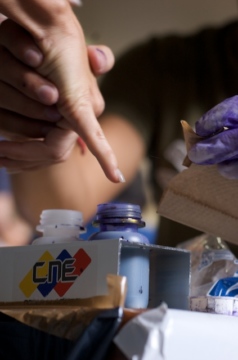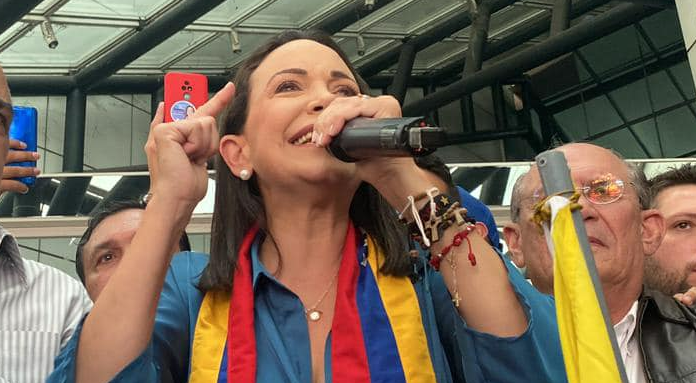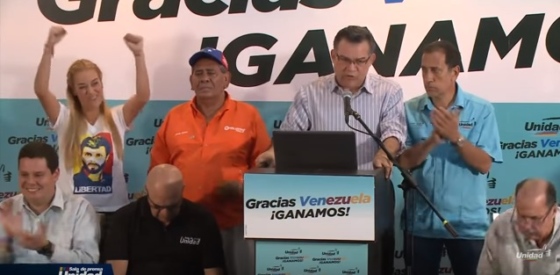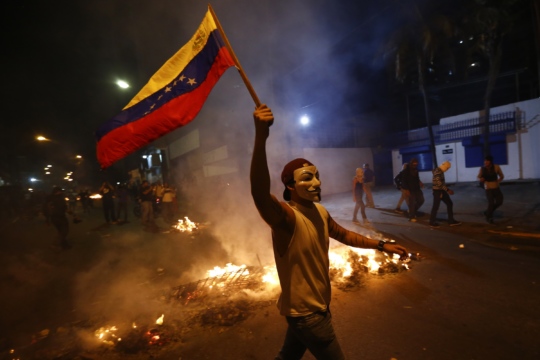
Venezuela’s Questionable Election Observers
Without credible observers, Venezuela’s December 6th elections will be another step towards disaster.
A Daily Publication of The Dialogue
María Corina Machado, a front-runner ahead of the Venezuelan opposition’s primaries, was barred from holding public office for 15 years, the country’s controller general said in a letter, saying she supported U.S. sanctions against Venezuela, Reuters reported June 30. Machado, a former lawmaker, was leading in the polls against a dozen candidates seeking the opposition’s nomination to challenge President Nicolás Maduro in the 2024 election. How will Machado’s ban affect the opposition? Which contenders are best positioned to win the opposition’s nomination, and what challenges do they face ahead of next year’s presidential election?
Vanessa Neumann, CEO of Asymmetrica and former Juan Guaidó-appointed Venezuelan ambassador to the United Kingdom: “The ‘inhabilitation’ of María Corina Machado (MCM, to whom I am related through marriage and family business) is a farce like any other in the alternate universe of Maduro authoritarianism. Citing her support for U.S. sanctions and Juan Guaidó is risible. The Maduro dictatorship is banning MCM because she is in the lead, precisely because she is not tainted by having been part of the failed Guaidó experiment: she was sidelined by his G4 coalition, which was racked by scandals of corruption and incompetence. As an outsider, MCM spoke her mind, but played no role in influencing U.S. sanctions policy. If anything, the ban gives her credibility with voters. Having my own three ‘arrest warrants’ from Maduro, I know first-hand what a reputational boon that is. The July 13 debate among the eight top contenders was more a show of relative positions, as the numbers and format make a true debate impossible. It was nevertheless inspirational for the inclusion of three women: MCM, Delsa Solórzano and Tamara Adrián, who is also transgender, having been born a man. I personally know all of them to be strong fighters. The opposition’s plan of citing a line of succession should the winner be barred from holding office will be no more than a menu for the Maduro dictatorship, who will surely pluck them off one by one. They will need to present a plan to give credibility to a parallel electoral process through international, local and civil society observation, outside the regime’s system. Only such a solid operation will get them and the Venezuelan people to rise again to challenge Maduro as in 2018. Otherwise, I (and many others) fear this may be no more than Guaidó 2.0, and then all hope of Venezuelan democracy will be truly extinguished.”
Peter M. Siavelis, professor of politics and international affairs at Wake Forest University: “A cursory look at recent polling might suggest that María Corina Machado is poised to become Venezuela’s next president. President Nicolás Maduro’s popularity is sinking amid the implosion of the Venezuelan economy, hastened by the migration of seven million Venezuelans who have already fled the country in desperation. In a recent poll, 72 percent of Venezuelans expressed a desire for regime change, and others show Machado with almost 60 percent of the vote of those intending to participate in the opposition’s primaries. However, despite these numbers, the ban creates some profound problems for the Venezuelan opposition, and by extension for any potential nascent democratic transition in the country. While Machado has been banned from holding public office, she can still stand in October’s primaries, which will be held independently from the government-controlled National Electoral Council. There are already at least 14 opposition candidates, with her closest competitor, two-time presidential candidate Henrique Capriles, polling at around 11 percent. Taking the clear leader off the political stage could split the opposition and lead to breakaway candidacies, dashing the hopes of a unified opposition to Maduro heading into the general election. The opposition is also awaiting a ruling by the country’s top court that could potentially suspend the primary entirely. Whatever the outcome, the decision by the controller’s office to ban Machado sends a strong signal that the upcoming elections will be anything but free and fair, and a lack of any sort of democratization on the horizon worsens an already tragic and desperate situation for the Venezuelan people.”
José R. Cárdenas, principal at the Cormack Group: “The Maduro regime’s disqualification of opposition front-runner María Corina Machado effectively ends the Biden administration’s policy of conditioning sanctions relief on regime actions to improve electoral conditions for presumed presidential elections in 2024. The experiment in deprioritizing economic pressure in favor of both direct diplomacy and quiet mediation from others has run its course. U.S. policy needs a fundamental reset. It needs to, first, immediately desist from basing its Venezuela policy on hopes for a legitimate presidential election next year, and second, reprioritize sanctions as the tip of the policy spear. Just as important, U.S. policymakers should now prioritize assisting the opposition in carrying out the primaries scheduled for October. This will be the only electoral process of consequence anytime soon for Venezuela. There, the Venezuelan people will have the opportunity to choose the unquestioned leader of the opposition, who will have to credibility to marshal the opposition forces, represent and mobilize popular discontent against the regime, and—backed by the United States—represent the opposition in terms of any negotiation with the regime. With its recent elimination of the electoral authority and now the disqualification of the leading opposition candidate, the regime has moved from ‘non-action’ in refusing to institute conditions for a freer and fairer election to one of deliberate action to further guarantee the outcome. The Biden administration and other international actors need to recognize the new Venezuelan reality and adjust their policies accordingly.”
Michael Skol, head of Skol & Serna, and former U.S. ambassador to Venezuela: “The banning of Machado is the clearest signal yet of something that has been obvious for some time now: that Maduro knows that he is stronger than ever and sees no need to allow an election that would evict him from Miraflores Palace. His intransigence has been fortified by the leftward slide in neighboring countries, waffling in Washington, unwavering backing from the likes of Iran and China and ever-increasing income for him and his cronies from multi-national criminal activities. Maduro is well aware that María Corina Machado would triumph in a free vote. And any other candidate who comes close will also be banned—or worse. She will not become president of Venezuela under the present system, but Maduro’s action has strengthened her leadership of Venezuelans against Maduro. What we once called ‘the Free World’ clearly recognizes her for what she represents—and Maduro and his supporters for what they do not. Her courageous effort should become a building block toward readiness for any contingency, whether forced by sanctions or by popular uprising. U.S. policy must now change: from the fantasy of negotiating with a criminal dictatorship to, first, full support for the coming primaries and, next, to recognizing the winner (presumably María Corina Machado) as the only legitimate representative of the Venezuelan people.”
 The Latin America Advisor features Q&A from leaders in politics, economics, and finance every business day. It is available to members of the Dialogue’s Corporate Program and others by subscription.
The Latin America Advisor features Q&A from leaders in politics, economics, and finance every business day. It is available to members of the Dialogue’s Corporate Program and others by subscription.
Without credible observers, Venezuela’s December 6th elections will be another step towards disaster.
What do the election results mean for President Nicolás Maduro and his grip on the presidency?
An economic and humanitarian crisis, precipitated by the Maduro regime, has brought Venezuela to the brink of collapse.
 Venezuela’s controller general last month barred prominent opposition contender María Corina Machado from holding office for 15 years. // File Photo: Facebook Page of María Corina Machado.
Venezuela’s controller general last month barred prominent opposition contender María Corina Machado from holding office for 15 years. // File Photo: Facebook Page of María Corina Machado.

